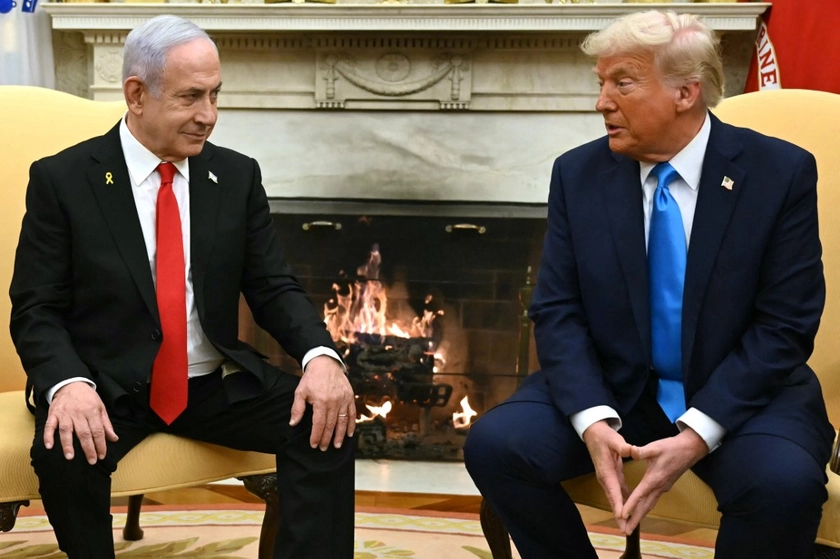US President-elect Donald Trump on Sunday warned the BRICS nations about launching their own currency, while showing no signs of reversing his plans to ease sanctions on Russia as part of a peace deal with Ukraine.
“We require a commitment from these Countries that they will neither create a new BRICS Currency, nor back any other Currency to replace the mighty U.S. Dollar or, they will face 100% Tariffs, and should expect to say goodbye to selling into the wonderful U.S. Economy,” Trump wrote on his social media platform, Truth Social.
JOIN US ON TELEGRAM
Follow our coverage of the war on the @Kyivpost_official.
“They can go find another ‘sucker’,” Trump continued in his appeal to the blue-collar base that elected him against their financial interests. “There is no chance that the BRICS will replace the U.S. Dollar in International Trade, and any Country that tries should wave goodbye to America.”
At their meeting in Kazan, Russian Federation, in late October, the members of BRICS (founded by Brazil, Russia, India, China and South Africa) floated the idea of creating their own currency to compete with the dollar and to combat what Russian President Vladimir Putin has long lamented as American “hegemony” in a “unipolar world.”
Trump’s proposed 100-percent tax on American consumers who purchase goods originating in those countries comes in addition to his plans to impose similar tariffs on goods from Canada, Mexico and, again, China. Most economists spike across the board, as an uptick in import prices also allows domestic producers to charge more.

FSB Alleges Ukraine Mailed Explosives as Perfume to Military Officials – Kyiv Intel Denies It
As a result, American consumers, already stretched to the breaking point by relentless inflation at the supermarket and department store, would find themselves spending even more on everything from avocados, breakfast cereal and coffee to Apple products, Bluetooth speakers and car parts.
The bloc is not confined to those founding members, however. Earlier this year, Egypt, Ethiopia, Iran, the United Arab Emirates and Saudi Arabia joined as well. The Kazan meeting was attended by more than 30 delegations, 22 heads of state or government as well as, quite controversially, UN Secretary-General Antonio Guterres.
While Trump has been tough on tariffs, his team has proposed to soften the US position on sanctions. His selected special envoy for the Russo-Ukrainian war, Keith Kellogg, described the incoming administration’s plan to CNN on Friday: It would partially ease sanctions against Russia in exchange for a cease fire, freeze the front lines, and introduce a demilitarized zone in Ukraine. If Moscow agrees to the terms of a peace deal, he said, sanctions on Russia will be lifted altogether.
Even some conservative voices in America don’t like the logic.
An opinion piece in the right-wing tabloid New York Post published on Sunday, co-authored by the director of the Center on Europe and Eurasia and a senior fellow at the Hudson Institute, read:
“President-elect Donald Trump says he wants to end the war. This is the right goal, but Putin is the lawless aggressor and shouldn’t be bailed out. And the economic sanctions against Russia are starting to work well.
“Russia may be gaining on the ground, but if it gets a big chunk of Ukraine and sanctions are eased with no significant compromise on its part, we’ve essentially bailed it out. Big mistake: The Kremlin’s revenues from oil and gas exports, which comprised 60% of total government income before the invasion, are today down over 37%.”
Meanwhile, the Wall Street Journal reported on Sunday that China is keeping a close eye on Russia’s sanctions-evading playbook, setting up an “interagency group set up in the wake of the Ukraine invasion has been reporting back to Beijing with lessons it can use in case of war and Western penalties.”
In September, clarifying his platform on the campaign trail at the Economic Club of New York, Trump said he would likely draw back sanctions on the Kremlin, preferring to use tariffs instead.
“Ultimately [a sanctions package] kills your dollar and kills everything your dollar represents,” Trump said.
You can also highlight the text and press Ctrl + Enter











